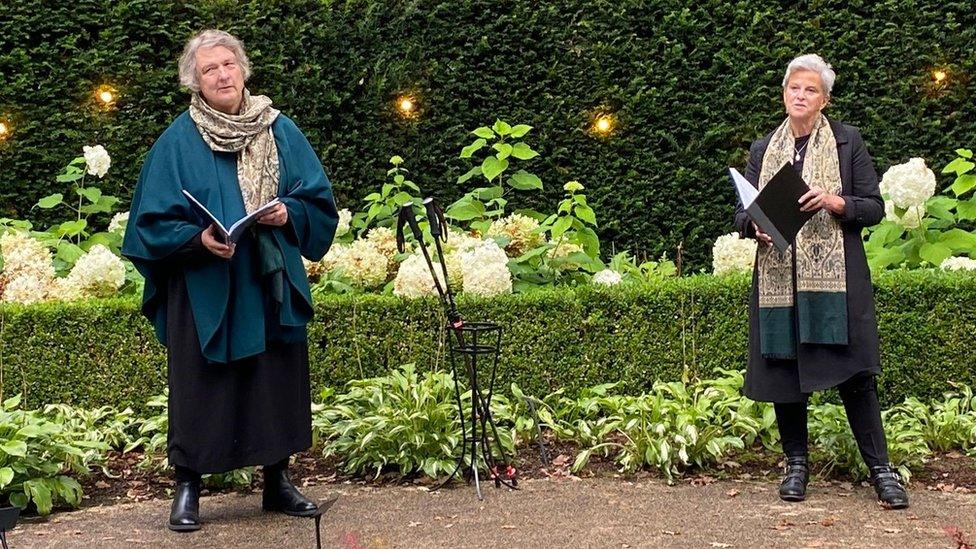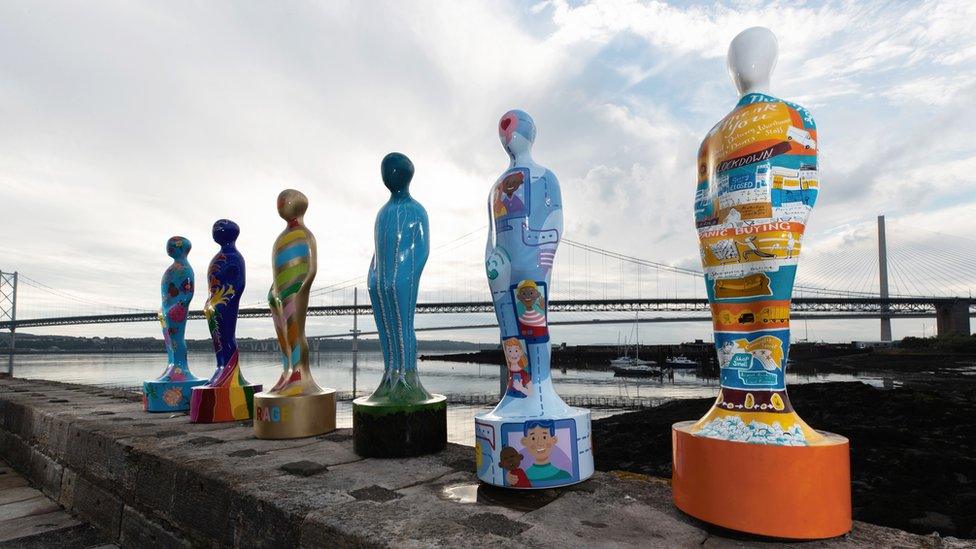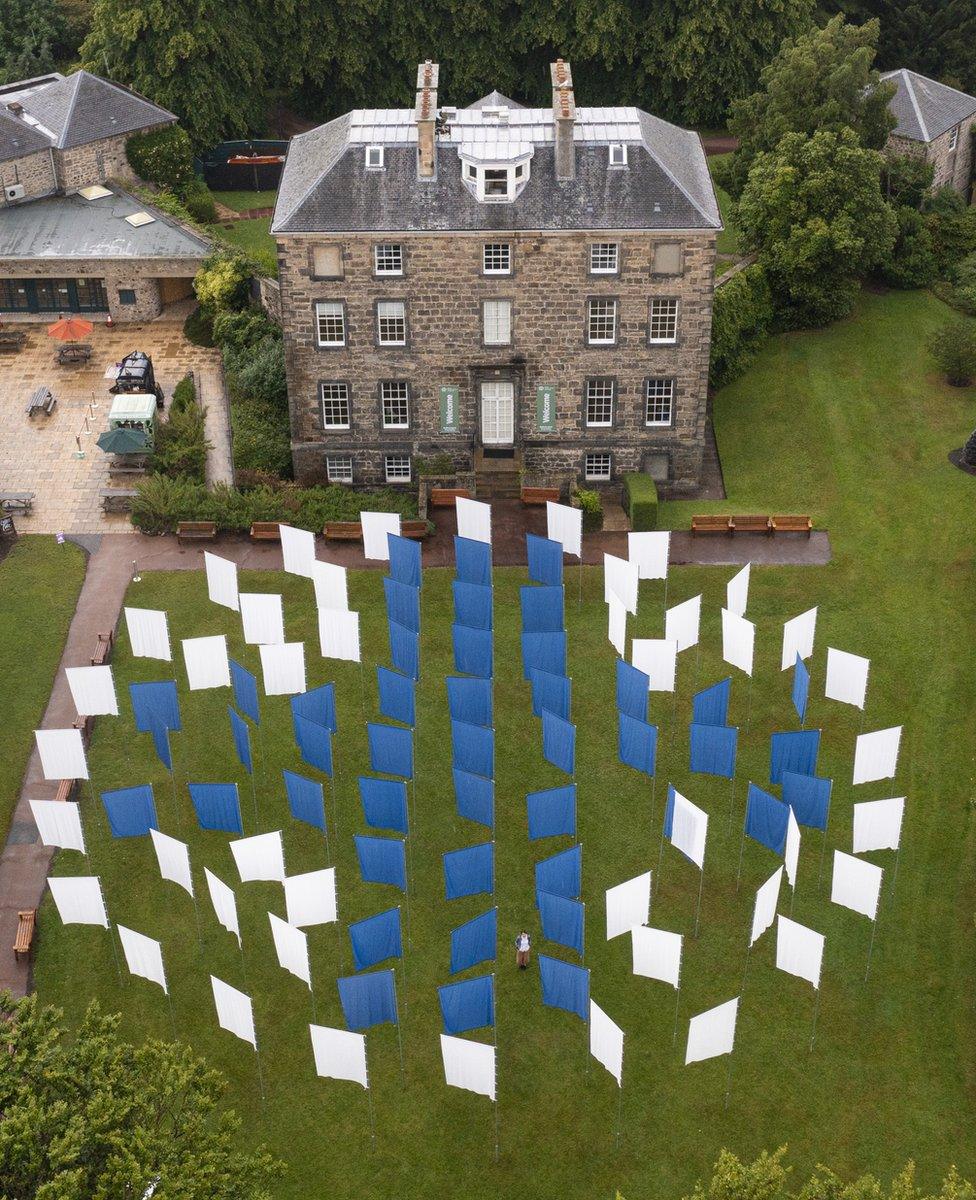Theatre finds ways to mark the grief of the Covid pandemic
- Published

Jo Clifford and Lesley Orr created The Covid Requiem
Covid has had a massive impact on the theatre but now writers and performers are looking for ways to acknowledge the effect the pandemic has had on us all.
The Covid Requiem begins in the gardens above Pitlochry Festival Theatre, which is apt because the building itself has been dark for the past 18 months and will not open again until the spring of 2022.
Co-creators Jo Clifford and Lesley Orr says they both lost loved ones shortly before the Covid pandemic and were able to celebrate them and share their grief in the way they chose.
Since the pandemic began in March last year this has been more difficult.
In the early days of lockdown, many people were unable to be with their loved ones in their final moments. Funerals were basic and restricted, with no room for individuality.
Jo and Lesley wanted to create a piece of theatre to allow people to mark their loss, to remember their loved ones and to celebrate their lives in a quiet, reflective moment.
It's not a religious ceremony but standing at the entrance to the gardens, with their matching golden paisley patterned scarves, Jo and Lesley seem like celebrants.
There is music too, gently played on guitar and fiddles throughout, and a reminder that Covid still calls the shots, with composer and musician Duncan Chisholm forced to pull out at short notice because of the virus.
"You see these massive musicals opening in the West End and it just makes me really angry," says Jo Clifford.
"They reopen as if nothing has happened.
"We have to acknowledge that something has happened. Millions have died and we can't just go back to normal without acknowledging that."
It is a sentiment repeated across the country.

Gratitude is a touring installation of 51 sculptures
In Newhailes Gardens on the outskirts of Edinburgh, a touring installation entitled Gratitude has 51 sculptures, each designed by a different person, among them fashion designers Pam Hogg and Zandra Rhodes.
There is an app which allows you to listen to the words of key workers describing their experience of the pandemic and musician KT Tunstall reads the words of Roslyn Neely, CEO of Edinburgh Children's Hospital charity.
"The hospital was very quiet throughout, with only one family member allowed to visit at a time, and the playrooms were all closed," she says.
She goes on to describe how they found ways to make the wards brighter, less scary, and safe for the young patients.

Luke Jerram's In Memoriam saw 120 NHS bedsheets, fluttering like flags on the lawn in memory of all those who died

Is it too soon to talk about Covid?
Those who've been creating work, right from the start, don't think so.
Like filmmaker Grace Barnes whose film Lerwick Lockdown documents the start of the pandemic in Shetland.
Or almost every one of the National Theatre of Scotland and BBC Arts' Scenes for Survival, created in lockdown conditions, about lockdown conditions.
For some, creating is a way of surviving. Edinburgh based Rowan Alba set up an art project to help their community cope with social isolation.
CARDS - community alcohol-related damage service - have created enough new work to stage a small exhibition in the Botanics.
That was the setting for Luke Jerram's work In Memoriam, which saw 120 NHS bedsheets, fluttering like flags on the lawn in memory of all those who died.
Despite its scale, it offered a quiet moment of reflection for anyone who visited.
Back in Pitlochry, Lesley Orr believes no-one is unaffected by the pandemic. We all need a moment to stop, and reflect on the loss.
She says: "It affects us all. Every single one of us. It's global. And that's why we wanted to give people a space to reflect, to remember, to celebrate and to share our collective grief.
"And to get angry. So many things to protest and be angry about. It's a lament. Things need to be said before we can continue our journey."
The Covid Requiem ends in front of a cairn, where we're encouraged to place a stone for a loved one lost.
Many have names, and stories shared, of ballroom dancing, and football and family gatherings.
And a chance at last to remember them, not as grim statistics, but people, with friends and family left behind to bear their loss.